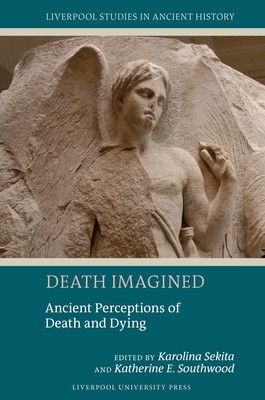
- We will send in 10–14 business days.
- Publisher: Liverpool University Press
- ISBN-10: 1802077588
- ISBN-13: 9781802077582
- Format: 15.6 x 23.4 x 1.6 cm, minkšti viršeliai
- Language: English
- SAVE -10% with code: EXTRA
Death Imagined (e-book) (used book) | bookbook.eu
Reviews
Description
Death is common and inescapable - everyone will agree. Yet, how one imagines the experience of dying and the beyond is very individual. Ancient cultures were not indifferent to this grim and painful moment and 'the unknown beyond'. Needless to say, representations of the final moments and transition to the world of the dead filled many pages and paintings of the past. Unsurprisingly perhaps, given that no one comes back to tell the story, the world of the after-death is stained by perception of the process of dying and a negative reflection of the world of the living. The present book explores the ideas regarding death, dying and the world beyond death of those who came long before us, living in Mesopotamia, the Levant, ancient Greece, Etruria and Rome. Even though separated by centuries, the reader will be surprised that the ancient experience of 'the unknown' does not seem unfamiliar, but still has much to offer in terms of reflection on 'when we are not'.
EXTRA 10 % discount with code: EXTRA
The promotion ends in 23d.04:47:01
The discount code is valid when purchasing from 10 €. Discounts do not stack.
- Publisher: Liverpool University Press
- ISBN-10: 1802077588
- ISBN-13: 9781802077582
- Format: 15.6 x 23.4 x 1.6 cm, minkšti viršeliai
- Language: English English
Death is common and inescapable - everyone will agree. Yet, how one imagines the experience of dying and the beyond is very individual. Ancient cultures were not indifferent to this grim and painful moment and 'the unknown beyond'. Needless to say, representations of the final moments and transition to the world of the dead filled many pages and paintings of the past. Unsurprisingly perhaps, given that no one comes back to tell the story, the world of the after-death is stained by perception of the process of dying and a negative reflection of the world of the living. The present book explores the ideas regarding death, dying and the world beyond death of those who came long before us, living in Mesopotamia, the Levant, ancient Greece, Etruria and Rome. Even though separated by centuries, the reader will be surprised that the ancient experience of 'the unknown' does not seem unfamiliar, but still has much to offer in terms of reflection on 'when we are not'.


Reviews